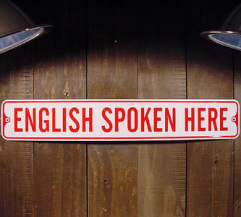August 27, 2008, - 10:39 am
Three Cheers for the . . . LPGA?: Biz That Needs American Viewers Mandates ENGLISH
By Debbie Schlussel
Not being a fan of women’s sports–especially not the WNBA or LPGA–I never thought I’d be praising an organized women’s sports league, much less the organizer of the Dinah Shore Classic a/k/a America’s national lesbian convention in Palm Springs.
But the LPGA is doing something all American businesses–and actually all American institutions and organizations–should be doing:
Mandating English.
If you don’t speak English, you face suspension. Bravo! Or, in this case, I guess it’s, “Brava.” (Yes, I know, that word is Italian, but if you’re reading this, you know I speak English.)


For many years, the LPGA tour has impressed upon its membership the significance of communicating efficiently in English. By the end of 2009, it will be mandatory.
The LPGA is adopting a policy that will require its member golfers to speak English or face suspension. All players who have been on the tour for two years could be suspended if they fail to pass an oral evaluation of their English proficiency starting at the end of the 2009 season. The tour announced the policy to its South Korean membership in a mandatory meeting Aug. 20 and has spoken to many players from other countries.
There are 121 foreign players from 26 countries, 45 from South Korea.
“We’re focusing on the fact that we’re in the sports entertainment business and we have to interact with fans and sponsors,” LPGA deputy commissioner Libba Galloway said. “We want to emphasize to our players that they need to be approachable.
Hillary Clinton didn’t speak in Spanish at last night’s Democratic National Communist Confab. And there’s a reason. The Dems know that Americans who speak English still command the ballot box (despite the many ballots printed in a gazillion languages–another travesty).
And the LPGA tour knows that people who consume its primary moneymaker–TV broadcasts–are still mostly English speakers.
But there’s another reason: Though the LPGA Tour has players fro many foreign countries, as noted above, the largest number of foreigners in the golf league are from South Korea.
And unlike what I call the “Jose Lobby”–La Raza, LULAC, and assorted other Hispanic organized whining orgies–the “Cho Lobby” just isn’t powerful enough yet. If they were–if Korean-Americans were as well-organized as Hispanic and Muslim lobbies–this rule would never fly.
But don’t worry, the Florida ACLU is on the case.
We should applaud the LPGA for doing the right thing, even if it wasn’t done for the right reasons (marketplace and money versus what’s good for America):
The LPGA policy says players who have been on the tour for two years can be suspended if they fail an oral evaluation of their English proficiency starting at the end of the 2009 season.
The tour provides tutoring and language-learning software to its players and will work with those who fail the test.
“It’s something that has been coming about gradually,” said LPGA deputy commissioner Libba Galloway, who added that only a few of the organization’s members can’t speak English. “We’re more of an international tour now, but we’re an American-based tour and the players need the tools to interact with fans and sponsors. One of those tools is to speak English.”
No major U.S. sports leagues, however, require players to speak English. Nor do the PGA Tour or ATP.
“We are proud to have tournaments in 30 countries and players from over 100 competing in them and have no plans to impose a common language on them,” ATP spokesman Kris Dent said.
Dumb move. The LPGA is making a smart move, regardless of what liberal lawyers try to do.
Howard Simon, executive director of the American Civil Liberties Union in Florida, said a language requirement could be in violation of state law.
“Florida law prohibits discrimination in public accommodations,” he said. “They may well violate Florida discrimination laws because language is a key element of person’s national origin. People should be judged on their ability to perform a job. English fluency has no more to do with the ability to play 18 holes of golf than whether you walk 18 holes or ride 18 holes.”
Galloway, however, said the LPGA can stand its legal ground. “Organizations and businesses in general have the right to make requirements on skill sets necessary for their employers,” she said. “We as a membership organization have the right to establish obligations that our members must adhere to in order to do the things fundamental to conduct our business.”
One of those is to play pro-ams.
“If there is a language barrier hampering the pro-am experience, that hurts,” Pepper said. “You don’t want any barriers when it comes to what the LPGA does best, and that’s to interact with fans, sponsors and pro-am players.”
Seon Hwa Lee, the only Asian with multiple victories this year, works with an English tutor in the winter. She told Golfweek, which first reported the new policy Monday, her English is improving. “The economy is bad, and we are losing sponsors,” Lee said. “Everybody understands.”
The policy was endorsed by Kate Peters, tournament director of the LPGA State Farm Classic. “This is an American tour,” Peters said. “It is important for sponsors to be able to interact with players and have a positive experience.”
Exactly. Speaking English is a matter of survival. Not just for the LPGA Tour, but for America as we know and love it.



If there is no English, there is no athletic excellence. If a competitor can’t speak English, she should take the time from her practice schedule to learn it.
EarlWestheimer on August 27, 2008 at 9:38 pm